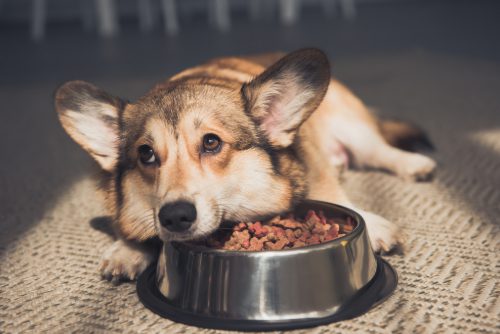Many dog owners have experienced the frustrating moment when their pup eagerly accepts a treat but ignores the food in their bowl. If you’ve asked yourself, “Why is my dog not eating his food, but will eat treats?” you’re not alone. While treats may be exciting and flavorful, skipping regular meals can be a sign of several different factors, ranging from behavioral preferences to health-related issues. Below, we’ll help you better understand what might be behind this habit and help you recognize when it’s time to seek veterinary guidance from the team at Gulf Winds Animal Hospital.

Why Is My Dog Not Eating His Food But Will Eat Treats?
Dogs often choose treats over meals because treats are more appealing in taste, texture, and smell. Most commercial dog treats are high in fat, salt, or sugar, which makes them more palatable than everyday food. When a dog refuses kibble but still wants treats, it’s natural to wonder if this is simple pickiness or something that needs attention.
Some pets may be holding out for tastier options, while others could be experiencing changes in appetite due to dental discomfort, stress, or underlying illness. Since this behavior can stem from multiple reasons, paying attention to patterns and discussing them with your veterinarian at Gulf Winds Animal Hospital in Panama City Beach, FL, is the best way to understand what’s going on.
Behavioral Reasons Dogs Prefer Treats Over Meals
Behavior often plays a big role in why your dog might avoid their food but eagerly take treats.
Learned Preferences
If your dog realizes that refusing their kibble results in getting more treats or human food, they may continue this behavior. Dogs are quick learners and may use mealtime as a way to hold out for tastier options.
Stress or Environmental Changes
Dogs are sensitive to changes in routine or surroundings. Moving to a new home, traveling, or having unfamiliar visitors can cause temporary stress that affects eating habits. A stressed dog may still accept treats because they’re quick and comforting, while ignoring a full meal feels overwhelming.
Feeding Routine Inconsistencies
If meals are offered at varying times or if treats are given frequently throughout the day, dogs may lose interest in scheduled meals. Establishing a routine can make a difference in how appealing regular food becomes.
Medical Reasons Behind Food Refusal
While behavioral factors are common, health issues can also explain why is my dog not eating his food but will eat treats.
Dental Problems
Oral pain from issues like tartar buildup, gingivitis, or a broken tooth may cause your dog to avoid harder kibble. Treats, especially soft or chewy ones, may feel less painful to eat.
Digestive Discomfort
Upset stomachs, sensitivities, or gastrointestinal changes can reduce a dog’s desire to eat a full meal. However, dogs may still take treats because they’re smaller, more enticing, and easier to digest.
Underlying Illness
Changes in appetite are sometimes linked to underlying health problems. Skipping meals but still eating treats may be an early indicator that something isn’t right. Regular veterinary exams are important to rule out medical causes.
How Treats Affect Appetite
Many pet parents don’t realize how much treats can influence regular eating behavior.
High Palatability
Treats are designed to be irresistible, often containing ingredients that enhance flavor and aroma. When compared to everyday food, dogs may naturally prefer them.
Treats as Reinforcement
If treats are given too frequently, dogs may start to view them as their primary food source. Over time, this can condition them to reject their actual meals.
Risk of Overfeeding
Excessive treats can fill a dog up before mealtime, making them less interested in their regular diet. This can lead to unbalanced nutrition if it happens consistently.
Encouraging Better Eating Habits
If you’re noticing this behavior often, it helps to look at both your dog’s routine and overall health.
Establish a Feeding Schedule
Offering meals at consistent times helps set expectations. Leaving food out for extended periods may encourage grazing and reduce interest in structured eating.
Limit Treats
Treats should be used for training or special rewards, not as a replacement for meals. By reducing treat frequency, dogs may be more motivated to eat their regular food.
Monitor Behavior and Appetite
Keep track of when your dog refuses food and how often they accept treats instead. Noting these patterns can provide helpful information for your veterinarian.
When to Contact Your Panama Beach Veterinarian
If your dog skips meals occasionally but otherwise appears healthy, it may not be cause for immediate concern. However, if the behavior becomes consistent, it’s important to ask, “Why is my dog not eating his food but will eat treats?” and seek professional guidance.
Call Gulf Winds Animal Hospital at (850) 233-8383 or book an appointment online if you notice:
- Meal refusal lasting more than a day
- Weight loss or changes in body condition
- Lethargy, vomiting, or diarrhea
- Signs of dental pain or bad breath
Your veterinarian can evaluate whether the behavior is simply a preference for treats or linked to an underlying medical issue.
Helping Your Dog Get Back on Track
Dogs thrive on consistency and balanced nutrition. While treats can bring joy and serve as useful training tools, they shouldn’t replace full meals. If you’ve been asking yourself, “Why is my dog not eating his food but will eat treats?”, remember that a combination of behavioral patterns and health factors could be at play.
Working with your veterinarian at Gulf Winds Animal Hospital in Panama City Beach, FL, can help you find the reason behind your dog’s eating habits and create a plan that supports their long-term health. Call (850) 233-8383 or book an appointment online to discuss your dog’s appetite changes and how to encourage better mealtime habits.
Recent Posts
About Us
Dedicated to pet health and wellness, Gulf Winds Animal Hospital provides services such as routine check-ups, diagnostics, surgery, and end-of-life care. Our compassionate staff prioritizes personalized care to support the well-being of every pet we treat.
